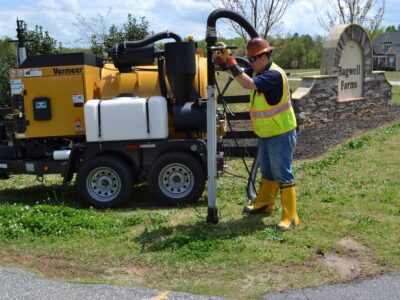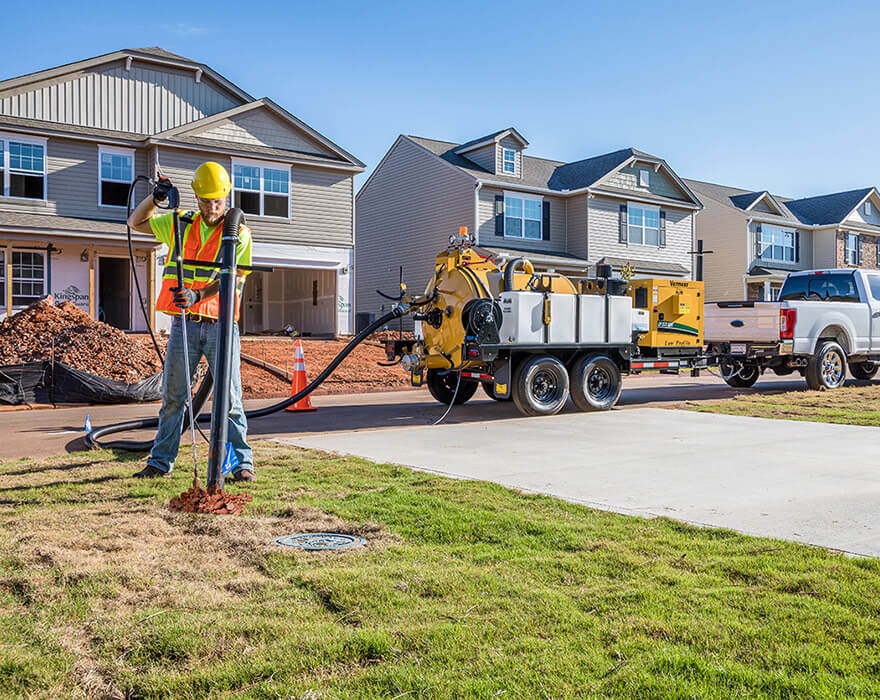Did you know that many Vermeer dealerships have a vacuum excavation specialist on their team? You may be asking yourself — what is a vacuum excavation specialist and how can they help with my business?
Vacuum excavation continues to gain popularity as the benefits of soft dig solutions move mainstream. It allows existing infrastructure to be exposed using pressurized water or air to break up the ground and a vacuum to collect the debris. The vacuum excavator also allows access to areas a traditional excavator can’t access, can dig in cold climate conditions where the ground might be frozen and can be used to clean out pits.
But as the use of vacuum excavation equipment continues to expand outside of the horizontal directional drilling industry, new users need vacuum excavation training. This is where a vacuum excavation specialist can add value to your business.
“Initially, vacuum excavation trucks and trailers were targeted to our underground customers,” said Sean Montgomery, Vermeer RDO hydrovac specialist for California.
But the applications for vacuum excavation extend far beyond this niche.
“There are a lot of other markets that need attention, such as environmental remediation, oil fields and industrial plant maintenance,” he added.
Particularly with new users, questions often arise as to which vacuum excavator is best suited to a particular application. What are the best operating practices and where can operators turn for vacuum excavation training? The vacuum excavator specialist provides the answers and can streamline the learning curve associated with most vacuum excavation applications.
“I have been in the vacuum excavation business since 1999,” said Brian Showley, vacuum excavation specialist at Vermeer Southeast. “It has been growing nonstop in leaps and bounds since then. There are certain jobsites where they are not allowing you to put a shovel or anything mechanical into the ground.”
Soft dig often becomes the only viable solution. Successfully integrating soft dig technology into daily operations requires the right equipment, vacuum excavation training, appropriate maintenance practices and experience. A vacuum excavation specialist provides expertise to help make sure the equipment is compatible with the application. This specialist helps train the operators, is a useful resource for the maintenance department and is a valuable resource to help flatten the learning curve. These vacuum excavation specialists draw on vast industry experience to get new vacuum excavator operators up and running quickly while helping solve issues faced by the most experienced vacuum excavation operators.
Specialists help identify the right tool
The wide variety of applications for vacuum excavation can sometimes make it challenging to choose the best setup without expert advice.
“Small directional drilling jobs, larger directional drilling jobs, bigger excavation jobs like power pole setting and industrial applications where large vats and byproducts are vacuumed out all have different requirements,” Showley explained. “The role of the vac specialist is to understand the different applications and know what type of vac truck best meets the application-specific needs.”
Several criteria need to be factored into the decision, including what tasks the vacuum excavator will be expected to perform, how much excavating and vacuum power will be needed, physical size and weight considerations and the truck chassis to be used. This will help determine critical features such as tank size and vacuum cubic feet per minute.
Driver qualifications and weight also influence the selection process.
“Choosing a vacuum excavator has a lot to do with the restrictions faced by an organization, whether that is being overweight, licensing, down to the type of soil they are in,” said Montgomery.
Even the availability of dump locations can influence the choice.
“Air dig gets brought up here in the Southern California market because it is so hard to find places to dump,” added Montgomery.
Proper selection also means matching the vacuum excavation tool to the truck. Truck vacs are sophisticated tools that require the vac unit to communicate with the truck chassis through a CAN bus system.
“There are a lot of moving parts,” Showley explained. “This is an area where the vac specialist comes in, working alongside that salesperson in properly configuring the truck.”
Specialist provides vacuum excavation training
Getting the proper vacuum excavator setup for the application is just the beginning. The operator needs to understand how to properly use the tool in varying conditions.
“A hydrovac specialist traditionally across the U.S. is that person the contractor can call to arrange all of their vacuum excavation training, whether it is in-house training or coming to the dealership,” says Montgomery.
The training can be tailored for the customer. For instance, an operator who has already been running a vacuum excavator may get up to speed in a single day. A new operator that has never operated a vacuum excavator will require more time. This tends to include many customers who use jetters. By the time the vacuum excavation specialist leaves, the customer is confident that that they can call at any time and get answers to their questions.
Vacuum excavation training is among the top priorities for a vacuum excavation specialist.
“I get calls throughout the day with questions and concerns from operators,” recalled Showley.
The objective is to serve as an efficient one-stop solution for the operator.
“On a day-to-day basis, every one of those operators are in my phone,” he added. “I am in their phone. I am their first call. If they contact me with an issue, I can sometimes troubleshoot right over the phone and get them going again. In cases where the issue might be more involved, we just point them in the right direction.”
This includes identifying when the truck chassis manufacturer or a service department might need to be involved.
“You have a truck that is a substantial investment,” said Showley. “Operators are hard to find, so when you find one, you need them trained right. You need them trained quickly. You need them to go to work, and then you need them to have that one call to troubleshoot or ask questions throughout the day.”
The vacuum excavation specialist strives to provide operators with the vacuum excavation training needed to succeed.
“If I keep the operator happy, I keep my customer happy,” explained Showley. “The less the owner has to hear from that operator and the more production they can get, the better.”
Consulting with operators can help improve performance in various applications.
“The operator shows me what needs to be done, and I show him the best way to do it,” said Showley. “To become an expert operator on your own would require a long learning process. The vacuum excavation specialist streamlines this process. That is a serious benefit.”
Sometimes there are unique jobs where even the most skilled operator seeks advice.
“We just walk them through what we would do,” noted Showley. “That is very beneficial.”
Specialist helps identify maintenance needs
Vacuum excavation trucks typically run all day, every day.
“They vibrate, they shake, they go on rough terrain to dump. The maintenance is crucial,” noted Showley. “Informing customers on maintenance and helping them see the real value in doing that is another part of the job. Then we train them how to do it.”
The experienced specialist provides useful tips to help maximize productivity as part of vacuum excavation training.
“Each truck can have its own little tendencies,” Showley explained. “I tell owners to try to keep the same operators with a truck. That way, they learn the specific details of that unit. Having one operator in charge of a truck at all times also helps keep employees more accountable.”
The goal of the vacuum excavation specialist is to be a partner with the operator and help them succeed with their soft dig operations.
“To have a specialist within each dealership brings a lot to the table,” noted Showley.
Contractors can now venture into the soft dig market with the assurance that they have access to training and expertise to help them succeed. Contact your local Vermeer dealer to get in touch with a vacuum excavation specialist.
Vermeer MV Solutions, Inc. reserves the right to make changes in engineering, design and specifications; add improvements, or discontinue manufacturing at any time without notice or obligation. Equipment shown is for illustrative purposes only and may display optional accessories or components specific to their global region. Please contact your local Vermeer dealer for more information on machine specifications.
Vermeer and the Vermeer logo are trademarks of Vermeer Manufacturing Company in the U.S. and/or other countries. © 2023 Vermeer Corporation. All Rights Reserved.

